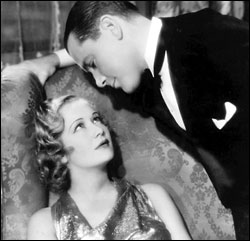
Looking for a classic, we once again dipped into Roger Ebert’s The Great Films, and came up with a wickedly funny, sexy, romantic comedy that puts to shame most of the romantic comedies made since. Released not long before the motion picture codes were put in place, “Trouble in Paradise” is frequently referred to as “sophisticated”. This is because it openly acknowledges things like sex between un-married couples, infidelity, and the fact that crime sometimes does pay.
Miriam Hopkins and Herbert Marshall play Lily and Gaston, a pair of thieves who meet up in an opening segment that exudes sex without being graphic. The story then jumps forward a few years, a period the two have apparently spent gallivanting around Europe, stealing for a living and living the good life. Their next potential victim, however, presents a new challenge to the pair. Madame Mariette Colet (Kay Francis), widowed heiress to a perfume dynasty, is beautiful and charming. She also turns out to be horny as hell, but un-tempted by the unsuitable suitors (Charles Ruggles and Edward Everett Horton) who hilariously vie for her hand. When she develops an interest in the smooth-talking Gaston, he can’t help but return the affection, and a classic Hollywood love triangle results.
“Trouble in Paradise” has crisp, clever dialogue that is a bit less affected and stage-like than that heard in many of the older movies. The cast is charming, and they are photographed beautifully. Charles Ruggles and Edward Horton in particular provide comedy that is second to none. In one hilarious scene, the two console themselves on losing Mariette Colet to Gaston (who is posing as her secretary), by discussing that he is the boring, reliable, secretarial type that women seem to go for (Neither of them knows, of course, that Gaston is a daring, international thief.)
Most folks in the film industry credit director Ernst Lubitsch with making this film the classic that it is. His famous “Lubitsch Touch” can be seen in the sophisticated wit and treatment of sexuality which makes this film age so well. Indeed some would say that modern times have not yet caught up with Lubitsch’s sophisticated treatment of sex and relationships. This is discussed in an excellent commentary by Peter Bogdanovich on the Criterion Collection DVD of “Trouble in Paradise,” which also contains an old Lubitsch silent film as a bonus. If you have the means, I highly recommend you pick one up.
5 stars.




No comments:
Post a Comment